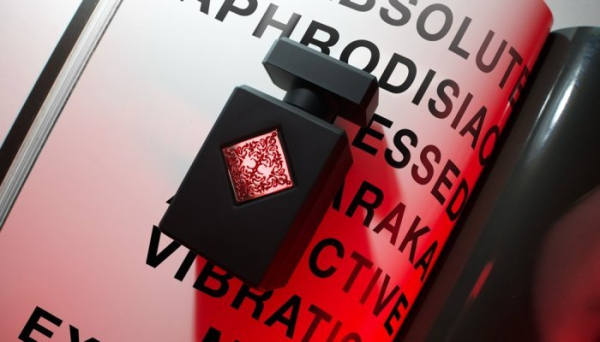
Exclusivity on new active molecules and unique scientific study protocols: by collaborating with the leading Swiss fine perfumery house, Initio Parfums Privés intends to position itself as an innovation leader. The niche brand of the Sprecher Berrier Group aims to meet consumers’ expectations for exclusive olfactory experiences and advanced functionalities, thereby accelerating its growth.
“We partnered with dsm-firmenich because we share the same passion for the olfaction-emotion-cognition triptych,” explained Quentin Dubois, Head of Initio Parfums Privés Europe, last March at the Paris Perfume Week.
Announced in late February, the collaboration between dsm-firmenich and Initio Parfums Privés is based on three pillars: the development of active molecules, direct access to technological tools developed by dsm-firmenich’s R&D department, and finally, the development and use of a new methodology for testing the functional benefits of fragrances.
The brand, part of the SBGC Group (Sprecher Berrier Group of Companies) alongside Parfums de Marly, founded by Julien Sprecher and acquired in 2023 by the Advent International fund, is banking on this strategic move to meet consumers’ expectations attracted by fragrances with proven emotional benefits.
Strengthening the brand’s foundation
“Our aim is to measure the emotional impact of the fragrance’s overall effect on both the conscious and unconscious mind,” emphasises Quentin Dubois. The goal is to establish a highly comprehensive and rigorous scientific protocol, as the brand seeks to reinforce its pioneering position in fragrances that influence emotions. This will enable the brand to promote precise, certified claims to an increasingly informed consumer base.
Initio Parfums Privés bases its value proposition on the concept of active fragrance. “An active fragrance is designed to have an active influence on the body, mind, and emotions through an ingredient – or a combination of ingredients – whose effect is recognised by science or age-old knowledge. For 15 years, the brand has been developing this vision of perfume as a transformative and transcendent object,” explains Quentin Dubois.
“At Initio, the collections are organised by function. For example, the Carnal collection is dedicated to desire, and the functional ingredient, used in overdose, is Hedione, which can activate the brain centres responsible for physical attraction and libido,” he continues. Since the rise of neuroscience, this positioning has been challenged by new perfume brands that have built themselves around the promise of bespoke emotions (Charlotte Tilbury, Vyrao, or Amoi Parfums).
A multidisciplinary R&D project
For 30 years, the dsm-firmenich Group has been studying the impact of smell via the limbic system, which processes scents in connection with memory and emotions. It collaborates with academic institutions such as the University of Geneva, and its research has resulted in more than 50 reference publications in the field.
“This partnership has allowed us to test, for the first time, the effects of a final fragrance on both the conscious and unconscious mind. We have comprehensively combined neuroscience with physiology, psychology, linguistics, and AI,” highlights Christelle Porchet, Corporate R&D Principal Scientist at dsm-firmenich and Head of the emotions and cognition programme.
AI for analysing behavioural data
The physiological aspect is considered at three levels. Firstly, at the cerebral level: “Using bio-sensor measurements, we examine the brain activity with EEG, electrodermal activity, and the heart rate with electrocardiography,” explains the scientist. Then, at the behavioural level, gestures, gaze, prosody, and intonation, produce relevant data, while AI can detect micro-signals, for example at the facial level, and objectify emotions. Finally, the third level: “Verbalisation, which expresses the emotion felt by the consumer and even helps to convince themselves.“
“Emotional responses are complex to study because each individual has their own experiences and culture. Context also plays a role, and it has been proven that perception is modulated by cognitive information,” analyses Christelle Porchet. “Thus, the information associated with a scent triggers different brain activity. A study from the University of Oxford showed that the same molecule, depending on whether it is presented as a cheese odour or a body odour, elicits different reactions.“
Objectifying the correlation between molecules and emotions
Responses are both conscious and unconscious, physiological and psychological. The challenge is to develop protocols that calibrate responses across individual differences to verify that the emotional variation is indeed due to the fragrance.
This is where ScentMove®, a dsm-firmenich-specific scale, co-developed with the University of Geneva, comes into play. It is based on 40,000 fragrances tested on 1 million consumers across six different cultures. The scale provides a model for verbalising emotions and allows the feelings aroused by fragrances to be assessed. From the verbatim used by consumers, nine categories of emotions have been identified. ScentMove® thus makes it possible to pinpoint the molecules that induce the desired effects.
The arrival of new molecules
Launched in March, the fragrance Power Self is the first milestone incorporating the advancements of this partnership. It is part of the Hedonist collection, focused on self-centring and inner harmony. It stimulates a measurable sense of comfort and self-confidence, with this rigorously established promise communicated transparently. Initio Parfums Privés thus underscores its ambition “to pave the way for a new era where science amplifies the power of scents.“
“We are now able to test active bases upstream before development and also evaluate them downstream. New molecules will soon be arriving,” reveals Quentin Dubois, announcing a busy agenda for late 2025 and early 2026.
